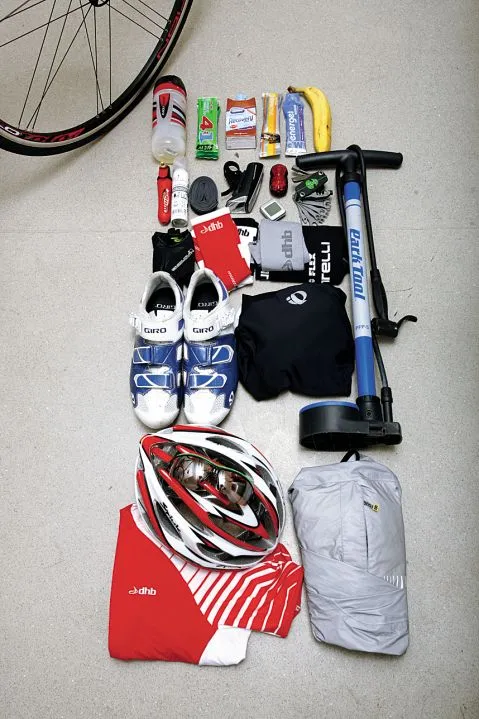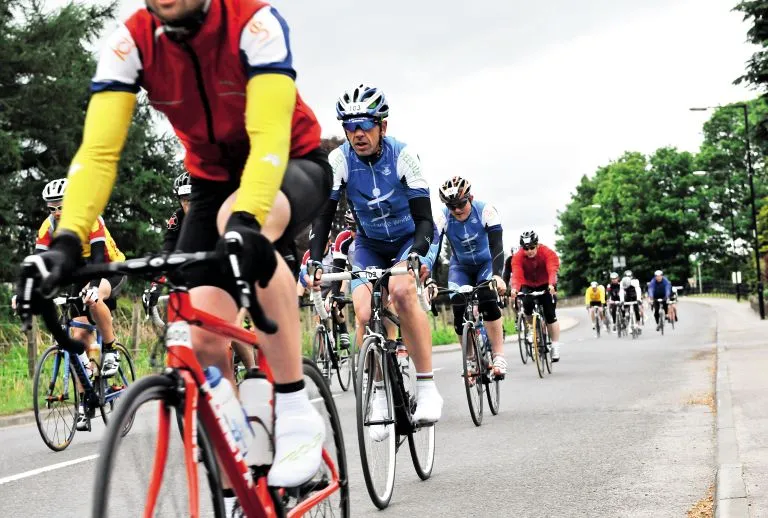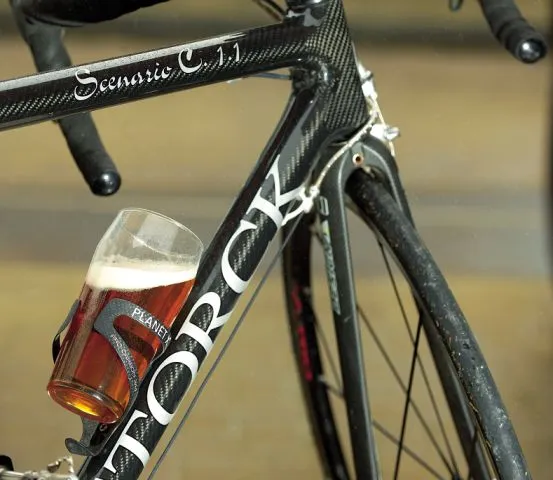Pack it all in
We know a rider who turned up at a big event on target for a personal best (PB), only to discover he’d forgotten his shoes. He didn’t get that PB. Make sure you’ve got everything ready the night before. Here are the essentials for any big ride – tick ’em off and sleep soundly.
- Helmet A lid is required for most organised cycling events.
- Your jersey and padded shorts You can ride a sportive in your vest and pants, but do you really want to?
- Shoes You won’t be driving there cleated so chuck these in your boot.
- Sunglasses Bring clear lenses for overcast days.
- Arm and leg warmers Easy to slip on or off on changeable days.
- Waterproof jacket You never know when the British skies will open.
- Chamois cream Chafing will definitely hinder your ride enjoyment and performance.
- Water bottles Make sure you keep well hydrated.
- Puncture kit Spare inner tubes, a repair kit, pump and tyre levers are essential.
- Pocket tools For emergency bike maintenance.
- Cycle computer For recording your ride stats.
- Lights A long, early or multi-day ride might see you starting or finishing in the dark.
- Sun block and lip salve Even on cool days the sun can be strong when you’re out for hours.
- Energy products Nutrition is a must.
- Mobile phone In case of emergency.
- Your bike Well, duh!

Get stuffed
Fuel up on carbohydrate 12 to 36 hours before the event, and at least four hours before you go to bed, to keep up glycogen levels. “Opt for high carbohydrate choices such as sweet potatoes, pasta or rice,” says sports dietitian Renee McGregor. “Avoid too much fibre or fat as this can have implications for gastro-intestinal discomfort. Protein should be limited to make more space for carbohydrate.” Renee suggests a sweet potato soup with bread, or a pasta dish with a tomato sauce. Then you could have a couple of crumpets with honey just before bedtime to top up your levels.
Morning munch
Two hours before your ride is the best time to chow down on breakfast. “You can top this up with energy drinks or a banana about 30 minutes before the start time,” says McGregor. “Make your choice carbohydrate-heavy such as porridge with banana and fruit juice or a couple of bagels with honey or jam. If you have time, make pancakes with syrup – often the breakfast of choice for the Tour de France cyclists.” Drink tea or coffee if this is part of your usual morning ritual and enjoy the benefits of the caffeine boost, but don’t try anything new on race morning as it could upset your stomach.

Pace maker
Too fast, too soon, isn’t the wisest sportive strategy. Nor is going so slow that you need to make up ground later. “The optimum pacing strategy on a flat course will always be to maintain the highest possible constant power output,” says Professor Simon Jobson of the Department of Sports and Exercise at the University of Winchester, and author of Ultra Distance Cycling.
“Varying power output will only slow you down. As a rough guide, a cyclist should be able to maintain approximately 75% of their Maximal Aerobic Power (MAP) output (around 88-92% HRmax) during a 30-mile ride, 68% of MAP (85-89% HRmax) during a 50-mile ride, and 64% of MAP (80-85% HRmax) during a 100-miler.” Having said that, we don’t often ride over perfectly flat terrain. “When hills enter the equation,” continues Jobson, “race times will benefit from increasing power on the uphill and recovering on the downhill.” As each course is very different, this makes replicable rules different. Listen to your body and don’t shoot off at a pace you can’t maintain.
Om nom nom
Fill your pockets with tried and tested energy products. Carry whatever gels, bars, flapjacks or anything else you’ve been using in training; avoid upsetting your stomach with anything you haven’t tried previously. If you do run out and find yourself at a feed stop with unfamiliar products, it’s wise to avoid them. Instead, opt for the 'real' food they’ve got there such as fruit, cake and flapjack, or you could make an unscheduled stop at a garage or corner shop. The following provide around 50g carbohydrate, the same as you would get from a 600-800ml, 6-8% energy drink:
475-600ml fruit juice
2 medium bananas
2 x 30g cereal bars
1 medium roll with tbsp jam
1 large or 4 small cookies or 2 small slices fruit cake
60-70g sweets, eg jelly babies, wine gums
Back in the tank
Post-ride refuelling is a must. Tuck into some protein for muscle recovery and carbohydrate to boost your energy. If you’re planning on exercising again in the next two days try to eat within 20 minutes of finishing, otherwise do it within two hours. And after churning out those miles, a congratulatory pint might be in order. You’ll be pleased to hear one study from Granada University found that having one pint of beer after exercise is more effective at rehydrating your body than a pint of water. Sounds like a good reason for a pub stop if ever we heard one.

Sign up to the Cycling Plus Newsletter here
Cycling Plus has been providing brilliant advice for 25 years – to get top training tips every month subscribe here!


